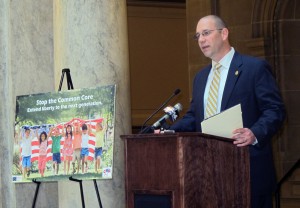Do Hoosiers Support The Common Core? Depends On Who’s Doing The Polling

Elle Moxley / StateImpact Indiana
Kindergarten and first grade students are already using the Common Core in their classrooms. Second grade was supposed to make the transition this year, but then state lawmakers paused rollout of the new standards.
What can recent poll numbers on support for the Common Core tell state education officials debating which standards Indiana schools will use next?
Not much.
The latest poll from pro-Common Core advocacy group Stand For Children shows 68 percent of Hoosiers support the new, nationally-crafted academic standards adopted by Indiana and 44 other states.
But a poll earlier this month from Governor Mike Pence’s administration found the exact opposite to be true — only 32 percent of Hoosiers support common academic standards.
“At this point you’re either taking numbers from a group that’s been pro-Common Core or anti-Common Core,” says Stand For Children spokesman Jay Kenworthy.
So who do you believe?
The two groups asked the question in very different ways. Stand For Children’s poll focused on the goals of the standards — setting common expectations for all students. The Pence poll looked at maintaining local control for Indiana schools.
And from the Stand For Children poll:Hoosiers express skepticism over the “Common Core” education initiative. Hoosier voters were more likely to share the view that “Indiana should not adopt Common Core because educational standards should be set at the local level, rather than a one-size-fits-all policy” (58%) rather than believe that the state “should adopt Common Core because it will set uniform standards for students in different states across the country” (32%). This result bolsters Governor Pence’s “first in the nation” effort months ago to hit the pause on implementing Common Core.
The Common Core State Standards have been adopted by forty-five states, including Indiana, which participated in their development with state governors, state school chiefs, and teachers involved in writing and reviewing them. The goal of the standards is to help all students have the knowledge and skills they need in English and math and that students would be held to consistent standards so that they will be prepared for their next steps after high school, whether they choose a college or career path.
Back in April, before state lawmakers voted to pause Common Core implementation, 54 percent of Hoosiers indicated they were in favor of sticking with the new standards. Those numbers were from Brian Howey, the same pollster who showed Glenda Ritz within striking distance of Tony Bennett last fall, and are more in keeping with the Stand For Children poll.
Stand For Children’s numbers also track with the latest national polls, which indicate most Americans don’t know that much about the standards.
“Eighty percent of the people say this isn’t a major issue they’re going to vote on,” says Kenworthy. “Any legislator who’s worried about a primary challenge or some electoral consequences to Common Core I don’t think fully understands this is a fringe issue.”

Elle Moxley / StateImpact Indiana
Sen. Scott Schneider, R-Indianapolis, speaks at a rally at the statehouse in January. After his initial proposal to stop Common Core implementation stalled, Schneider attached 'pause' language to another education bill.
Senator Scott Schneider, R-Indianapolis, penned Indiana’s anti-Common Core legislation after two parents approached him with concerns over the new standards.
“‘What is this? ‘What’s going? What is this new process of math?’ Those kind of comments from parents were coming in on a fairly routine basis,” says Schneider. “My guess is now that school’s started again, we’re going to get more of that.”
But even though it’s become important for a core group of Schneider’s constituents, he says he knows the standards aren’t on the radar of most people.
“I have always held that it is somewhat of a complex issue,” he told StateImpact.

